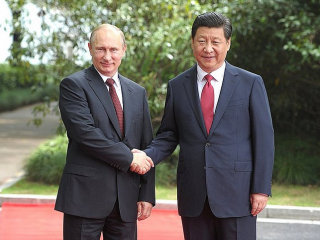China and Russia vs. America: Great-Power Revisionism Is Back
What will Washington's strategy be?
If accommodation remains undesirable, how should the United States and its allies deter modern revisionism? As long as revisionist states carefully choose their targets and means, there is no easy answer to the problem we face. It is simply not realistic to threaten war over each and every revisionist act for the aforementioned reasons. However, there are steps the United States can take.
The first is to describe revisionist acts for what they are. We should not downplay or seek to move on from territorial aggression. We must explain why it is an egregious violation of the international order, even where “nonvital” interests are concerned.
The second is to strengthen deterrence by denial. The United States should build defense capacity in vulnerable states and limit the offensive capabilities of revisionists, including training and equipping other countries to deal with unconventional warfare.
The third is to strengthen the regional and global order by making opposition to territorial expansion a cornerstone of U.S. foreign policy and by developing legal and diplomatic paths to counter it. In a practical sense, this means pressuring European nations to back the Philippines right to take a case against China over the South China Sea dispute and pressuring the BRICS to condemn Russia’s annexation of Crimea.
Finally, the United States must show that territorial expansion has long-term costs. The United States should clearly communicate to its competitors that a foreign policy of territorial expansion will cause it to move toward a strategy of containment.
Great-power revisionism is a centuries-old challenge. Previous leaders have failed to deal with it not because they were incompetent, but because it exploits real vulnerabilities in how states calculate their interests and devise their foreign policies. There is no easy solution, but some forewarning about the nature of the problem can, at least, lead to a diplomatic forearming.
Thomas Wright is fellow and director of the Project on International Order and Strategy at the Brookings Institution. Previously, he was executive director of studies at the Chicago Council on Global Affairs, a lecturer at the Harris School of Public Policy at the University of Chicago and senior researcher for the Princeton Project on National Security.
Image: Kremlin.ru

